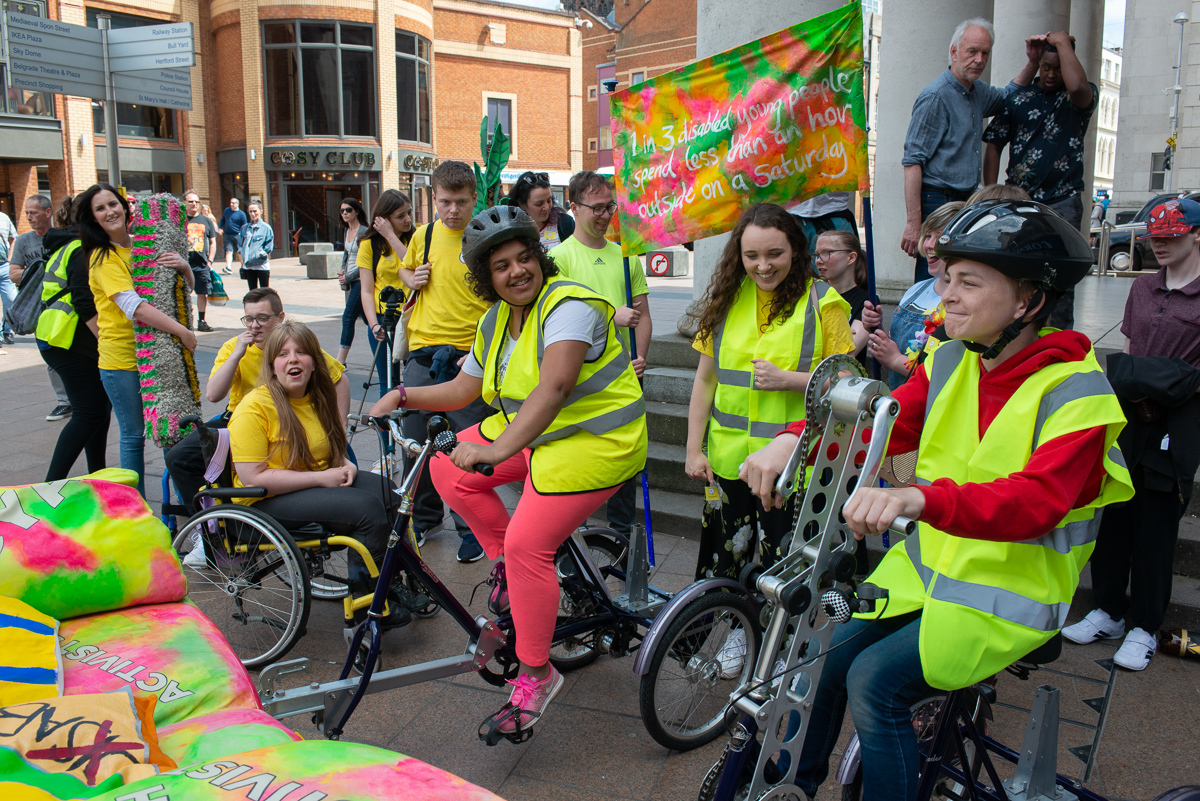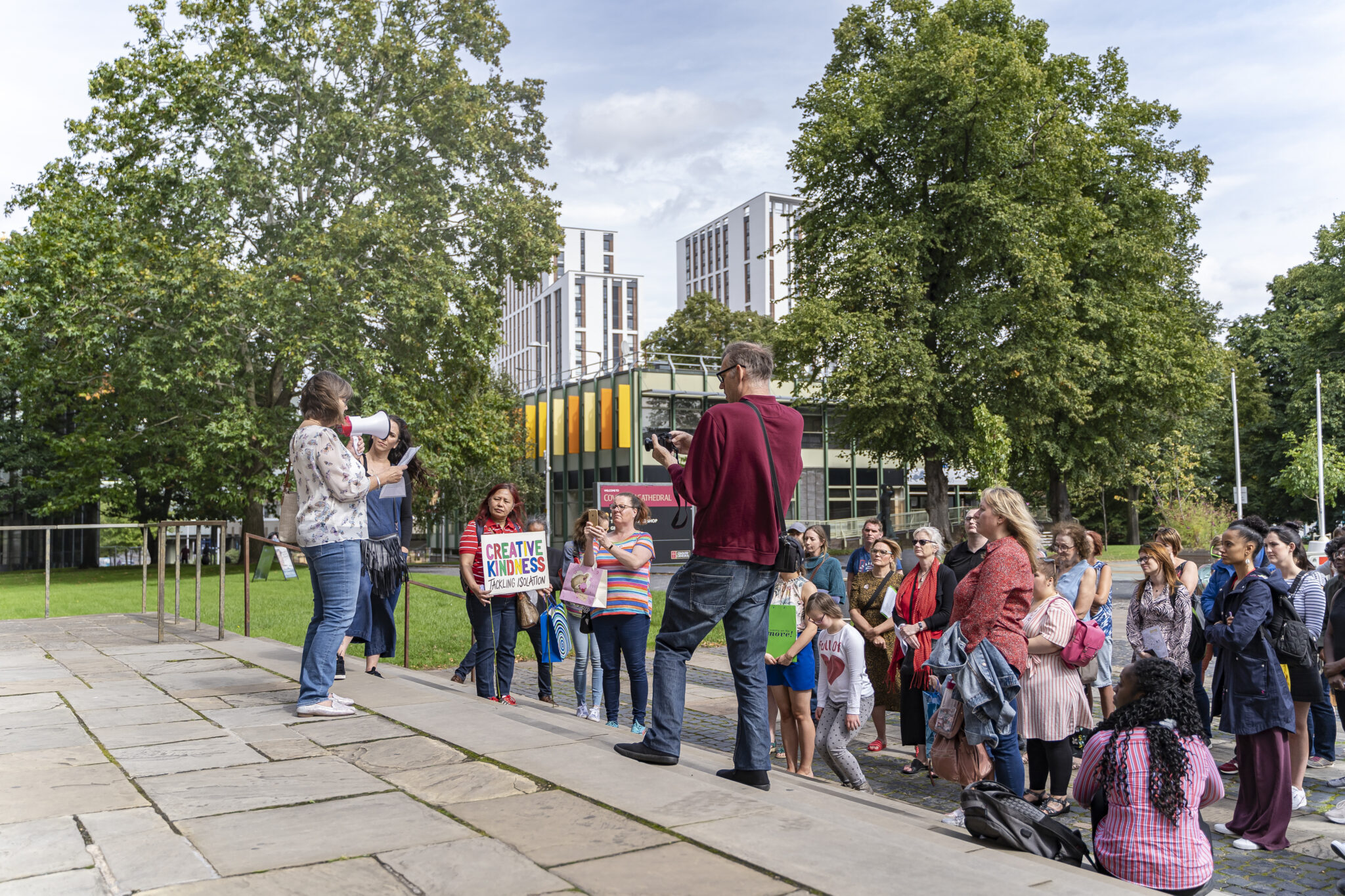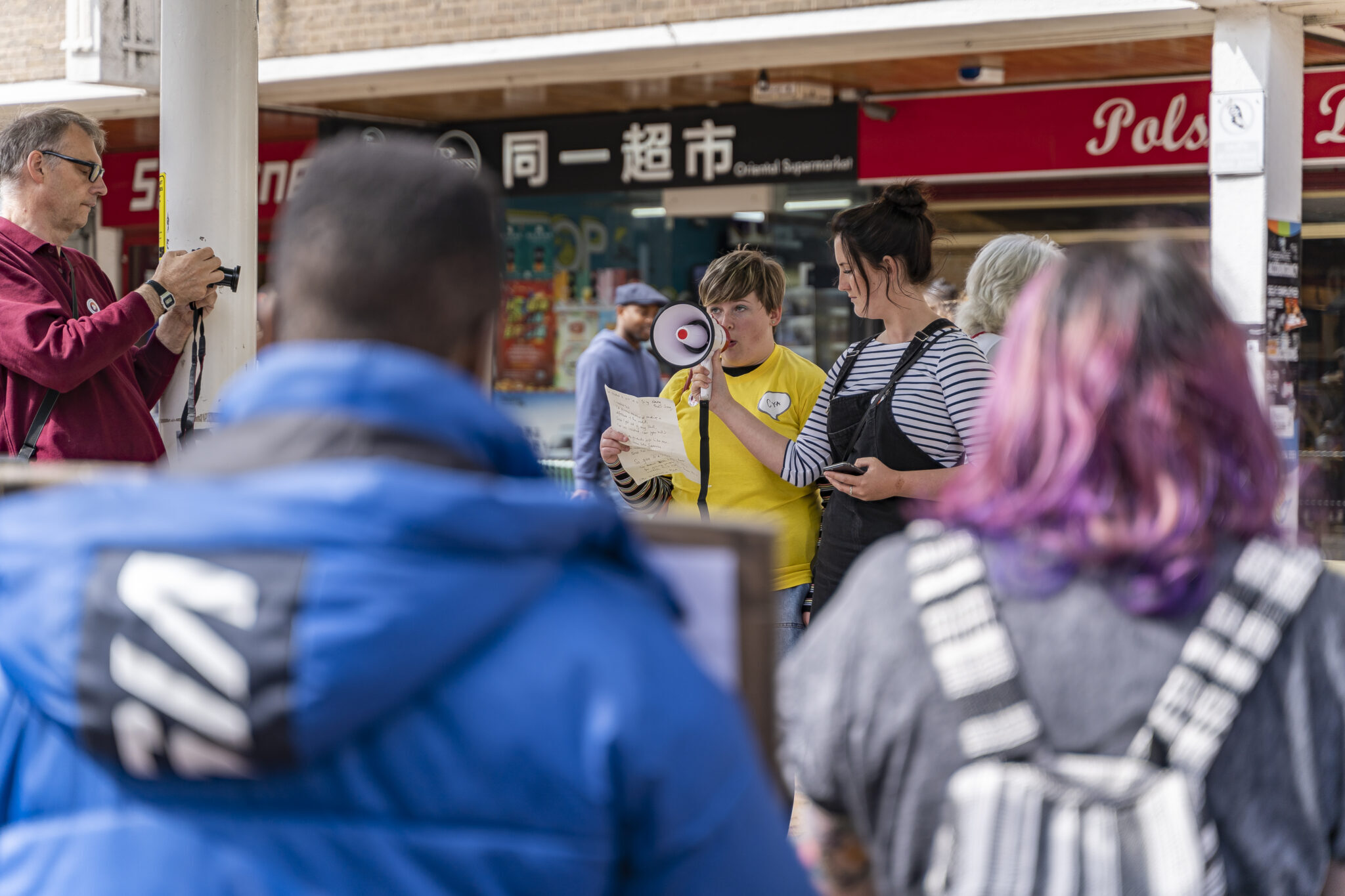Stories
Who is really leading?
A lesson on the realities of leader-full work.
Stephanie Wong | 12 Apr 2021

Coventry Youth Activists wheeling their sofa and starting conversations. Image credit: John Whitmore.
The relational-meeting approach is selective. Unless I get fooled, I have relational meetings with leaders only. First, a leader is someone with relationships who can deliver *their* followers… If you get caught with a follower, there’s an easy way out. Just say, “take me to your leader.”
The purpose of listening in organising is to identify leaders. What makes you a leader is if you have a following. Do people follow your words, actions, and ideas? The organiser’s job is to identify those leaders to act with many others, developing more leadership capacity and action. It is argued that leading is something we all can do, and it is a practice we all can learn. It is a liberating idea – a leadership from which no one is excluded.
What if you are organising with people who are systemically isolated? What if your movement is led by people who said, “I haven’t spoken to anyone in months,” or “I used to have a friend, but I don’t anymore?” What if your mission is to ensure that isolation is tackled and led by the people at the heart of the issue?
Grapevine is challenging organising methods that exclude people because they don’t bring followers or institutional power. The qualities of having a followership are not ignored but are not the only focus. The organisers at Grapevine focus on people’s strengths and what matters to them first. Drawing in a range of people from all walks of life aims to ensure more of us can build relationships. With this approach emerges leadership, where those most affected by the issue take charge.
This work is hard; we only get it right sometimes, but we are trying. And try we must. 1 in 3 disabled young people spend just 1 hour outside on a weekend. Grapevine is working to support the affected young people to build campaigns on this issue. Young people with learning disabilities and autism are fighting for their right to party, and tackling Disability Hate in the media with their efforts has received both local and national recognition.

This work is about more than just the practical outcomes. Grapevine and our team at Act Build Change are equally interested in “how we win” and “with whom”. We aim to build the power of people who are segregated in society. To push against the margins imposed on us by powerful systems and institutions. To resist those who say, “we do not believe in your value and potential”. We centre love and power in our practice of organising. As syrupy as that may sound, it is the only way to live in this world with dignity that you are of value just by existing. That’s what Grapevine has always done, how it has always worked.
In addition to identifying leaders and working with them, is working for their actual development so that they become recognised by their following as leaders in more than one limited sphere.
The focus on leadership development has always drawn me to community organising as a method of change. It is a pillar of our work as organisers. Yet, sometimes, I see us saying it matters but acting like it doesn’t. And the excuses for why we struggle to be representative aren’t often reasonable or as complex as they are made out to be. Grapevine and others show it can be done. Even when there is instability and difficulty, they keep going to a place of transformation with an individual—where their power surfaces. Power is always there, but in the words of Ella Baker, it “needs light to guide the way”.
This work is life saving, I wouldn’t be here now if I wasn’t part of CfG.
We support leaders to develop through a listening and storytelling approach. For example, through our listening we met Rose who now co facilitates the storytelling session of Changemaker University and has gone from leader to being a paid organiser. Rose is fighting with others to transform local issues, including food insecurity, fly tipping and opportunities for young people.
Storytelling is a crucial part of leadership; it is the vehicle by which we can communicate our values. Our life lessons can inspire others to have the courage to act.

When we first met Tom he said ‘I had a friend once but I don’t have one any more’. Eighteen months later and he’s an active member of Coventry Youth Activists, their latest campaign calls out the Facebook hate crime reporting process. He is also a key player in the Collaboration Station team. He doesn’t take no for an answer and isn’t afraid to hold you to account – as Stephanie will tell you. He also now has a group of people he can call friends. We could all learn so much from Tom.
It is not only about individual leadership. Collective leadership helps other community members to develop happier and stronger relationships with one another. Over 180 sessions have taken place in the past year including film screenings, quiz nights, audio & visual DJ sets, social suppers, campaigning, creativity workshops, family discos, and litter picking. A core team of local people leads each initiative, and they are accountable to each other on what they want to achieve by when. It ensures people from the movement are present to influence those positional power and authority. Be that a meeting with a funder, a journalist or a politician.
The co-designed Changemaker University programme helps to equip people with the skills and confidence to act on what they care about. 45 local people have been trained over three cohorts, each cohort is asked to help train the next cohort. Fifteen people are now helping co-facilitate sessions as well as helping to reflect and evaluate the programme. Unique to the city, the latest cohort is made up of local people, those working in the public sector, artists and people with long term health conditions, learning disabilities and autism.
Following will always have a place in community organising. But I am as interested in how we make space for more people to show up, participate and take responsibility for shaping their places. Or as Hahrie Han puts it “Leaders are distinct …because they take responsibility for outcomes, as opposed to merely showing up.” Fundamentally many more of us could be leaping into a more inclusive, accessible and humble practice of organising. Grapevine has taught me that.
Task
Reflection Questions
- How do you demonstrate trust in your organising? Could your trust be braver?
- How seriously do you and the teams you work with take accountability? What does this look like in practice? Could accountability be clearer?
- How are you unlearning the habits of “charismatic leadership” when it shows up in yourself or in others? How are you ensuring you are investing in the collective mission not an individual?
- Our gifts thrive in different circumstances – how do you make space in your organising for a multitude of circumstances for people to lead in?
- In what ways are you providing opportunities for leaders to shift and share power for systemic change?
This is the fourth in a series of posts about our work with Grapevine: